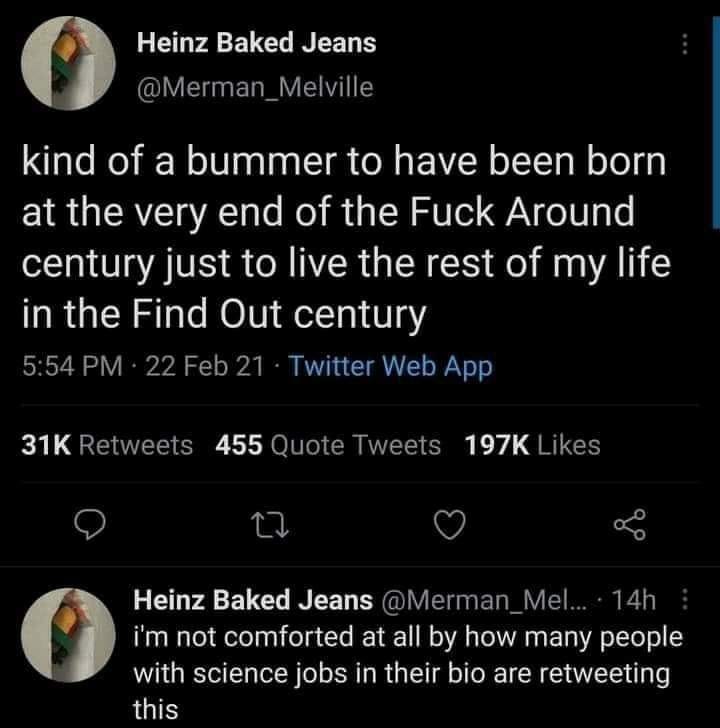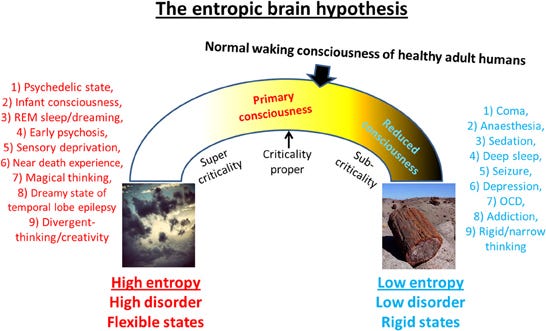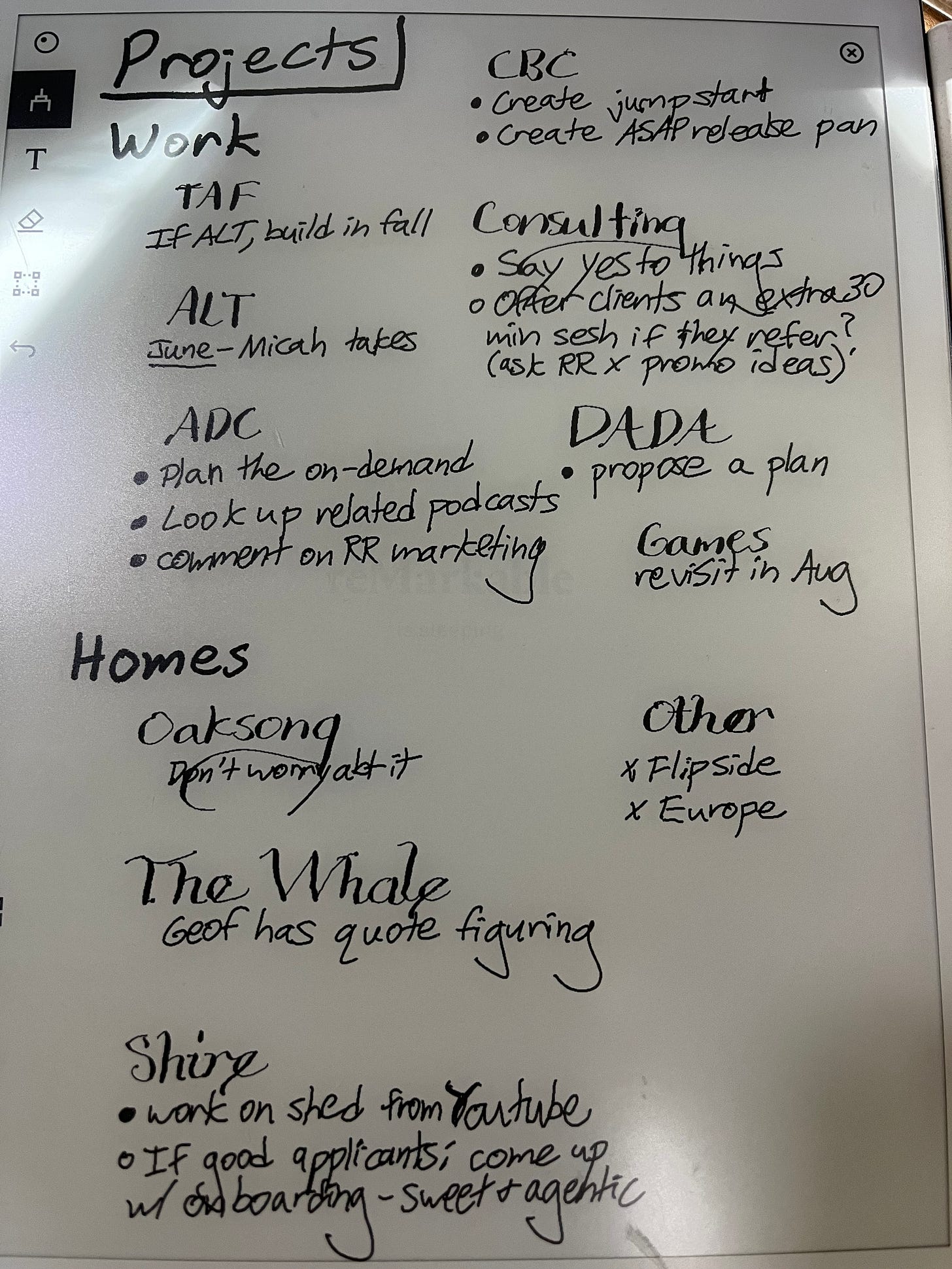I didn’t know what to write on this morning. Most of my current research is on things like “how to do drywall” and “how to take care of chickens”, which…doesn’t seem like something y’all can learn more about from me than Youtube. (Welcome to farm life!)
My search history also includes the question “What animals did Zeus turn into in order to bone people”, which is relevant to a little bonus present I’ll leave y’all at the end of this article ;)
Since research is not the primary thing on my mind, instead I’m just going to talk about something that is on my mind: surviving amidst uncertainty.
I promise, there is only one paper cited in this article 🤣
As you may have noticed, we currently live in an uncertain world. I imagine every generation throughout time has thought of their period as uncertain, but from my limited perspective, ours seems more so than most of the past.
We are facing multiple possible extinction events. We are under constant stress from work, overcommitments, money, and relationships. Our parents tell us to save for the future, but we have no idea what even the next five years will bring. Many of us don’t even know if we should have children, for fear of the world we would bring them into.
We consume meditation courses and self-help videos by the millions, but default to fantasy novels/movies, drink, and drugs in order to hold the uncertainty at bay. Sometimes, at least for me, it feels like my life is on hold, waiting for something certain to tell me I can move forward again.
Why is uncertainty hard?
Okay, just one science section.
I’m citing here from one of my favorite articles, which is actually on the neuroscientific mechanism of psychedelics. It talks about how our brain-states change in psychedelics - and also, what their default state is outside of that. This can tell us a lot about how we react to uncertainty.
The Critical Brain
According to this article, our brains regularly move between two states: “criticality” and “sub-criticality” (or “primary” and “secondary” states).
Sub-criticality is our everyday norm. In this state, we settle information we’ve taken from the world, and put it into patterns we can understand. We create order from the chaos. Most of the time, we are in this state of attempting to reduce disorder, entropy, and uncertainty by categorizing the world.
In criticality, we are more creative, intuitive, and impressionable. We may draw quick conclusions and have magical, unrealistic, yet enjoyable and profound thoughts. We enter this state when on psychedelics, when asleep, and in states of heightened activation. In a way, this allows us to catch up to our own realities and expand beyond them, giving us some relief from our default state.
What’s crucial here is that our brains are optimized for sub-criticality. They are built to reduce chaos. In fact, in this model, depression is a beneficial state for our brains.
Depression is ubiquitous today. I’d be shocked if most of you reading this haven’t either experienced it, are experiencing it currently, and/or are medicated for it. In this model, depression is a hallmark of the “sub-critical” state in which our brains usually operate: it’s a way our brain attempts to become current with reality. It has a more ordered pattern than the creative, primary state we get when on drugs, sleeping, or highly activated; and thus our brain defaults to it when uncertainty is high. As the article puts it,
One reason why it may be advantageous for the brain to operate just below criticality is that by doing so, it can exert better control over the rest of the natural world—most of which is critical….Indeed, if control is the objective, then it makes sense that the brain should be more ordered than that which it wishes to control….In such scenarios, uncertainty about the system is minimized because we know that it possesses a particular character. It is intriguing to consider therefore that disorders such as depression, OCD and addiction could be functional in some sense, perhaps working to resist a more catastrophic collapse to primary [“critical”] consciousness (with the onset of a psychotic episode for example) by reinforcing stable patterns of activity.
In other words: operating in the ordered, sub-critical state gives us a form of mental control over our reality. Depression supports this control, and keeps us from going to the far side of criticality, where we might become overwhelmed or psychotic.
Side note: one of the reasons I find this article interesting is that it may help explain why people are so into psychedelics these days. We’re in a world where the optimal state of being is more critical than sub-critical, since the rapid rate of change and uncertainty requires a flexible mindset - not what our brains are optimized for. Psychedelics put us into a critical state, which lets us catch up to reality. Perhaps there are other methods of attaining this impressionable state?
How We Deal With Uncertainty
TL;DR: neurologically, our brains don’t like uncertainty. So, when we encounter it, how do we deal with it?
The common current means I see people/myself using are:
Escaping it
Confronting it
Artificially reducing it
Actually reducing it
Integrating it
Ignoring it
Escaping uncertainty - Did you know that the Marvel cinematic universe is now the biggest movie franchise in history? I bet it doesn’t surprise you. These days, fantasy - movies, books, and video games - seems to be the drug of choice for getting out of our lovely sub-critical (and yet so critical) heads.
TBH I don’t see this as a bad thing. We all need pink fluff sometimes, in the same way that every difficult relationship needs us to stop fighting and go do fun stuff on occasion. Always being in the grind makes it hard to see that anything outside the grind can exist.
Confronting uncertainty - Most of the time, I see people starting to do this with the intention of taking a sip of pain, and ending up trying to drink the sea. X-risk (AI, environmental, and other existential-threat) researchers work tirelessly to solve our problems, until they get overwhelmed and burn out. The same for nonprofit and peace leaders. Autistic people seem to do a bit better at this, due to their capacity for mental filtering.
I think we can confront uncertainty at low doses. But we have a hard time compartmentalizing when we see the whole picture. And the news these days does so like to show us ALL the ways we’re fucked. This doesn’t mean we should stop confronting…just that we can’t try to confront it all at once.
Artificially reducing uncertainty - One of the downsides of the critical/primary brain-state I described in the article above is what’s called “magical thinking”. Medical News Today defines this as when a person believes that specific thoughts, words, emotions, or ritual behaviors have a special influence on the world around them.
This is most common among children, but I see it among adults these days too: a belief that controlling our thoughts and emotions, taking ritualistic actions like constantly posting on social media, having strict morning routines, or doing spells and ceremonies will make our world more controllable. Certainly these may have some effect, but most of the time, they seem about as useful as the old-timey rituals of sacrificing to the gods. It’s just that in this case, we’re sacrificing our time and sometimes our self-esteem. (Am I pessimistic about marketing lately? Why yes, I am! How did you guess?)
Ritualistic actions give us some comfort. They aren’t always magical thinking, and I believe they often have placebo effect. But they can become ingrained to the point where we get anxious when we don’t do them, or think that we can escape confrontation with what’s really happening in the world by obsessively reading the news about it.
I believe that in a similar way, superstitions and conspiracy theories work to artificially reduce uncertainty. They give us something more specific to focus on, a single explanation that makes sense of a complex topic. In reality, most difficult things in our world have causes as complex as the interaction of neurons in our brain. There is no single neuron or group that controls consciousness. Similarly, there is no single easy cause or solution for environmental decay, war, the economy, or why you can’t afford healthcare.
Actually reducing uncertainty - Another way we try to get out from under the weight of not-knowing is by reducing that weight. For instance, we stop reading the news; we switch to flip-phones instead of smart ones; we move out to the country and start a farm; we take retreats from real life. We limit our numbers of inputs, and thus have fewer worries to worry about.
I believe community is also a way of doing this: by spreading the weight and building a support network, we have a buffer for dealing when uncertainty arises.
Ignoring uncertainty - Similarly, we can ignore uncertainty by focusing on the present moment. We can do breathing exercises, take intentional walks, and shove our worries to the side of our brain for a few moments. Similar to escaping uncertainty, this allows us a break, which - similarly to sleep - I imagine can actually be useful to our brains.
Forever focusing on The Thing doesn’t necessarily make it better. Sometimes our unconscious has to chew on a problem before it pops up an answer, and sometimes our primary consciousness is smarter than our secondary, ego-brain can be.
Integrating uncertainty - I’m not actually sure how to do this. A serious meditator could probably tell you. The closest I get is resolving conflicts as soon as they arise, and making lists, so that uncertainty doesn’t stay on my brain and has a place to go for processing.
My ways of dealing with it
So, you may ask, Sara - how do YOU deal with uncertainty?
Making this list is actually why I wrote this article. But apparently I can’t do anything without a detailed preamble 😂 (See: Part 1 of my ridiculously researched article on contact theory). I wanted to record, and consider improvements to, my own uncertainty and anxiety-reducing strategies.
Here’s what I do. I would LOVE to hear your own strategies too!!
Walks in the country. Something about the permanence of nature makes me feel less uncertain. A tree isn’t going to move or change or freak out as fast as I will, so touching it brings me some of that same solidity. I am lucky enough to have 7 acres with a tiny trail around them, which I circle at least once a day, but I also take walks and runs in nearby parks.
Hyper-focusing on small controllable things. When my uncertainty is high, I give myself things to do that have a distinct beginning and end, and a success condition. This can look like cooking food, tending my garden, making candles, writing these articles, doing Papercraft models, or building book nooks.
Making small contributions to reducing others’ uncertainty. This gives me a support network, and happy feelings of generosity. I do this by providing places to stay for traveling friends, community through events, money for friends in need, and jobs.Navigating conflicts with collaborators as soon as they arise
Having a smaller house. I feel less uncertain when I control my environment, and having a tiny house that I can clean in 20 minutes is a huge help for this. Plus, something about the small space makes me feel held. My house is 240 sq ft and I love it soooo much.

Reading fantasy. If I have one addiction, it’s fantasy books. I actually don’t like this mode of reducing uncertainty, because it takes me out of life instead of integrating me more into it. But trying to keep myself always in the grind is hard, and I don’t love watching movies. I tend to binge series for about a month, and then detox for a month. I’m currently in detox mode, and am using my free time to play word games, read nonfiction, and play guitar instead.
Doing a news detox every few months. When I notice the news starting to negatively affect my mood, I stop reading it for a couple of weeks. When I am tracking, what I read is News Items by John Ellis. It’s a daily digest of the major newspapers. Highly recommend.
Substances. Where would we be without these. I take psychiatric drugs for bipolar (not really an uncertainty thing but it does control my mood swings, which made me very uncertain about how I’d interact from day to day!), occasionally smoke Delta 8 (a weed alternative that doesn’t make me anxious like normal weed does), occasionally smoke an e-cigarette when driving, and do a guided MDMA trip every 3-6 months.
Putting things on a list instead of holding them in my brain. This has been an extremely helpful method of reducing uncertainty for me. When I’m tracking a lot of projects, making lists assists in getting things off my brain and onto a to-do list. I use Asana as my to-do list, and I’ve recently started tracking things in projects on there instead of just as next actions, which has been extra useful for having somewhere to put future-project thoughts that can’t be currently completed (and so used to live rent-free in my brain).
How I’d like to deal with it
The main strategy I’d like to try integrating, that I haven’t yet, is…
Meditation - I feel like this would be a really helpful way to calm my mind and teach it to integrate anxiety better. But, I have never managed to establish a practice. Perhaps an accountability buddy would help?? HMU if you’re interested ;)
Okay, that’s all I’ve got for now. Again, I’d love to hear your own anxiety-reducing strategies - drop us a comment here so we can hear what you think!
Lastly, I promised y’all a present for reading all the way to the end.
Last weekend, I supported with a wonderful event that happens every year on our land. It’s called Bloody Easter, and it’s a wild performance, scavenger hunt, and feast organized by the one and only Sophie Kruip. This extravaganza consists of finding Easter eggs which lead you to a character, who gives you a challenge. If you complete the challenge you get to keep the egg (or this year, get a special feather). At the end the team with the most eggs or feathers wins!
At the beginning of the event, all the characters - of which I am usually one - give an opening speech. This year, the theme was Greek/Roman gods, and I was Zeus.
Here’s my speech.
I’m the king of gods, the dad supreme
Soon leader of the winning team
Mount Olympus’ pride and joy
A ray of sunshine, this homeboy.
I’m the greatest god around,
I take the crown for getting down
and unlike Hades, good with ladies,
make them wet as old Euphrates;
My wife Hera hates my guts
for my godly love of butts
But all those goddesses they sluts
and my swan song’s going nuts
Yeah I’m Zeus.
Bring the thunderrrrr
Yeah I’m Zeus
Let me hear you ROAR!
I take the cake for children planted
I’m a little…poly, granted
But even my skull sprouts babies!
Ain’t my fault I like the ladies.
Tho in truth, sometimes I wonder
if I really bring the thunder
is it just a spell I’m under
that I cain’ restrain my hunger
Am I sundered from the mother whose sons numbered three with me and am I doomed to groom my children for a selfish legacy?
No! I’m Zeus!
I bring the thunderrrrr!
I’m Zeus!
Let me hear you ROAR
Yeah you humans keep assuming
that if just the thunder’s booming
the true lightning ain’t as frightening
but my grip it’s always tightening
I fucked up the man who took my fire.
Make me pyres piled higher with the liars playing lyres to false kings that don’t inspire half the love that I’ve acquired! I’ve birthed dynasties entire!
You pay homage to my crew, and I’ll make demigods for you.
I’m Zeus
Bring the thunder
I’m Zeus
Let me hear you ROAR
I’m a Cronos cracking Rhea backing boulder bashing son of passion passing judgment on the masses, ain’t no god who’s got my fashion. Even as a bird I make you wet.
Come find me, and find what you can get.
Your weird, anxious, and loving thought-dom,
Sara








I deal with uncertainty with contingency planning. I'll go through the likely outcomes one by one, and decide how best to deal with it. It can make me feel I'm ready for whatever happens.
Always have a parachute and a plan B. You don't know this but there are always things gnawing at the back of your mind. Having options silences them.